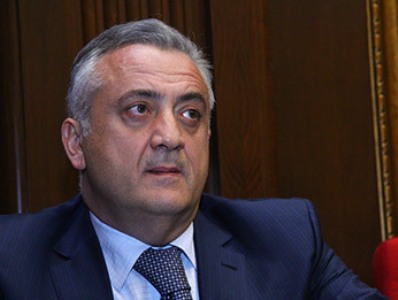


ArmInfo. It is inefficient to have a higher level of inflation to ensure a higher economic growth in a country where poverty level is above 30%, Arthur Javadyan, Chairman of the Central Bank of Armenia (CBA) said at the parliamentary hearings on the state budget 2016, Monday.
He said the low level of inflation envisaged by the budget 2016 - 4% +/- 1.5% - is able to ensure the economic growth target for the coming year and a sustainable macroeconomic situation. In response to the questions of parliamentarians about the thesis that inflation may affect the economic growth, Javadyan said it is a partly right thesis of a very short-term nature. In addition, he said, the country's economy very much differs from the economies of the countries that have resorted to such measure as inflation growth. He went on saying that in the context of the fiscal policy some parliamentarians are mistaken saying that the stable rate of the national currency obstructs the activity of exporters shipping goods to Russia where the ruble rate has devaluated tangibly. Javadyan countered that thesis with specific figures saying that the export of the Armenian products has increased significantly amid 30% decline of import. Javadyan explained that Armenia has improved its external balance, on the one hand, and spent less money on import, on the other hand. This has recompensed the 30% decline of private money transfers to Armenia and helped to appreciate the national dram too. The chief banker said an artificial devaluation of the national currency to support part of the Armenian exporters would increase the which had lost its position also before, considering that since 2009 the national currency has devaluated by 60%," Javadyan said. He drew the attention of parliamentarians at probable negative effects on such policy on the prices of energy resources, grain and essentials. Javadyan said the government realizes it needs to support the agricultural sector, where a record-breaking harvest was registered this year, and will further involve farmers in various programs and subsidize interests rates of agricultural loans.
Arthur Javadyan said the CBA will keep coordinating its fiscal policy with the government to ensure macroeconomic stability. He called it important to serve the state debt using 25.2% of the total budget expenditures for 2016, which is by 1.6% less in than in 2015. In addition, the budget will increase the capital investments to 9.4% of total expenditures that will make up 68.1 billion drams in 2016. Spending on the social sector will be increased by 3.9% comparing to 2015. Javadyan thinks that the budgetary expenditures and the continuously high level of the budget deficit will create certain inflationary pressure, which will not outstrip the target, however.
As for the challenges the country's financial sector may face in 2016, Javadyan outlined several factors the influence of which cannot be predicted fully, though the CBA constantly conducts stress tests and is ready to meet any unexpected developments together with the banking sector. The CBA is ready for any political developments in the world, including the events in the Middle East, even in case of their undesirable trajectory. Among the global factors affecting the economic situation in the country, Javadyan outlined the continuing instability in the global financial markets, geopolitical instability involving the partner- and neighbor-countries, the so far unresolved problem with high level of unemployment in the developed countries, low prices of raw materials, as well as the low price of energy resources and the shrinking growth rates of the world's largest economy - China.
Under the state budget 2016, GDP deflator index will total - 4%, 12-month inflation - 4% (+1.5%), budget deficit - 3.5% of GDP. Expenditures will total 1 trillion 373.7 billion AMD, and revenues - 1 trillion 183 billion AMD AMD, with the deficit being 197 bln AMD.